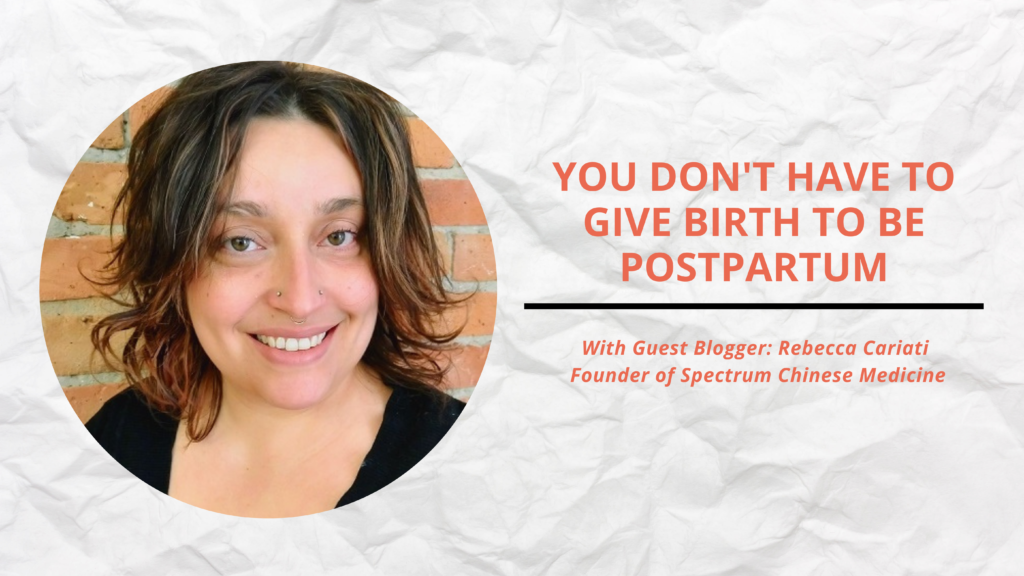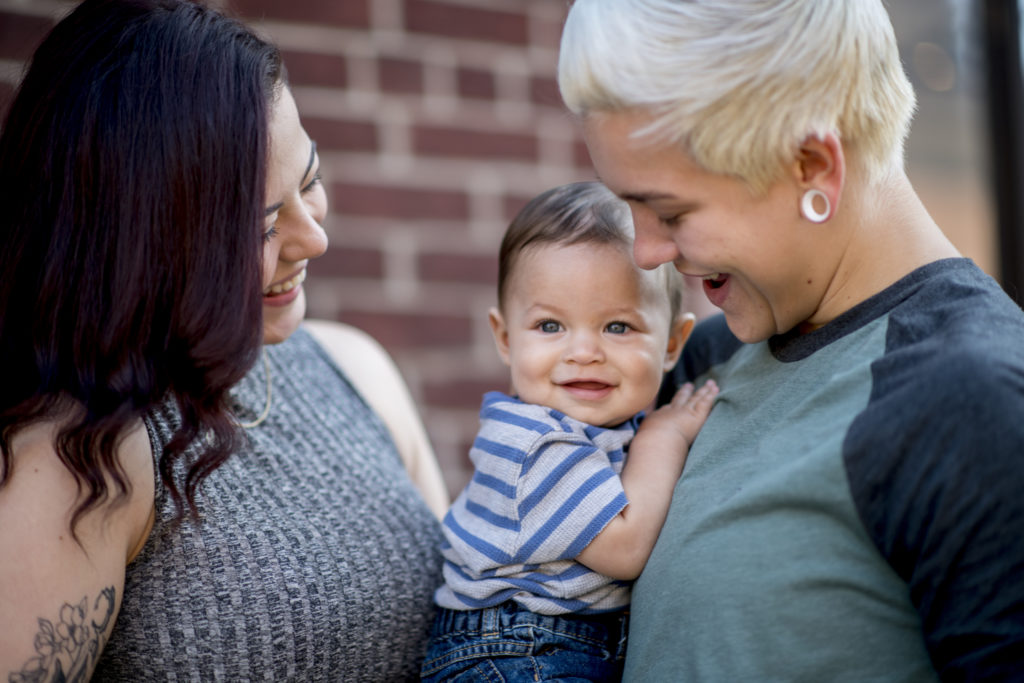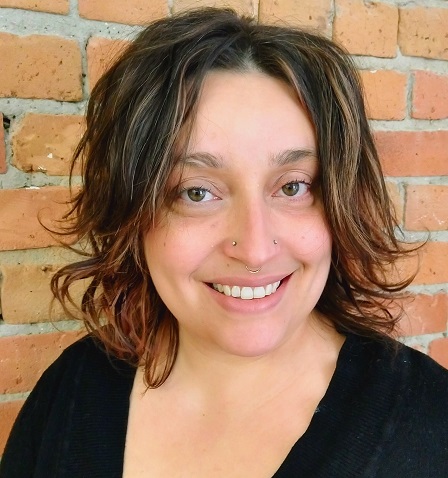You Don’t Have To Give Birth To Be Postpartum
How widespread misunderstanding of postpartum has created an accessibility gap and what we can do to close it

When I say the word postpartum, most people see an image in their mind’s eye of a cis-woman nursing a baby. Whereas that’s not entirely incorrect, it is still wrong. Wrong by way of omission.
What Does “Postpartum” Mean?
Postpartum depression has become so prevalent that a lot of people use the word “postpartum” as a shorthand for “postpartum depression.” When, in fact, “postpartum” is a Latin word in two parts. “Post” means after. “Partum” refers to birth. So, it means “after birth” or “the time after birth.”
Understanding the etymology of this word allows us to step outside of the heteronormativity that characterizes everything fertility, pregnancy, and childbirth. It gives us the space to see who has a rightful place in this group and why the healthcare community not seeing us all, matters.
Postpartum Bodies Come In All Genders
Genderqueer, transgender, non-binary, and 2-spirit people know this already. It’s the cis-community (LGBQ or not!) that needs to catch up and do some unlearning. As a femme-presenting, cis, Queer person who specializes in LGBTQX fertility, postpartum, and pediatric health, I see the fallout of our cis- and heteronormative beliefs of our medical system and culture all the time. And it’s got to stop.
Who Are the Invisibilized Postpartum Parents?
It’s the non-gestational parent (of any gender) who is feeling depressed, isolated, and delirious with sleep deprivation, yet isn’t acknowledging their experience as a “postpartum” experience because no one else in the room is. And because the midwife says they don’t “have to” come to postpartum visits, they get the message that their experience isn’t as important. I mean, if the midwife isn’t encouraging them to come in, why would they bother seeking care elsewhere. They didn’t give birth…
It’s the transgender person who has weathered so many micro (and macro)aggressions during their journey with fertility care, pregnancy, and birth, who just needs some help to sleep when their baby sleeps. But, they’re wary of being dead-named and invalidated by their providers. Because they know they don’t “look like” a postpartum parent, and they can’t bear another indignity, they don’t seek care.
It’s the adoptive parents of a newborn who are struggling with anxiety and feeling connected to their new baby, and who visit their doctor and don’t get asked about their mood or bonding. Their inner dialogue sounds something like, “I didn’t give birth, why am I depressed?” or “What’s wrong with me…I’ve wanted this baby for so long. I don’t have a right to feel this way.” So they suffer in silence.
It’s the single parent by choice whose baby came through the foster system and who is facing intrusive questions about how they’re breastfeeding a baby they didn’t give birth to. And who has to hide their intentions to induce lactation from their social worker because they might raise red flags.
And then there’s the sadly classic question that many femme-presenting lesbian or masculine-presenting gay couples hear, “So who’s the Mom / Dad?” Do we answer? Do we ignore? What do we say to that? How does this impact these parents’ mental health?
And all the while, these (and dozens of other family styles I didn’t present here) are already struggling to find gender-affirming care.
No wonder we’re not rearing to claim “postpartum” for ourselves. It would expose yet another gaping hole in our healthcare system. We need gender-affirming, Queer-competent medical care, like yesterday.
LGBTQX friends: Let’s reclaim the word “postpartum”
Being excluded from postpartum support groups or not being seen as postpartum parents by our healthcare providers and others isn’t our fault AND, if we choose to, we can do something about it. (To be clear, widening the postpartum group isn’t LGBTQIA-2+ families’ work to do, it’s the healthcare community’s responsibility).

Just as we’re still making space for ourselves as equal couples and families all over the world, claiming our place as postpartum parents (regardless of our relationship to birthing our babies), is critical to getting the care we need to feel well in these tender months and to show up fully for ourselves and our families.
Things you can do (if you have the spoons):
1.Call yourself “postpartum” in conversation with family, friends, and care providers.
2. Remind people that the research suggests that postpartum depression rates are nearly identical for gestational and adoptive parents. In other words, your mental health is just as important to take care of as gestational parents’.
3. Be honest about how you’re really doing postpartum, with those you trust. Why? The taboo around mental health is only compounded postpartum, and sharing your experiences with your intimate friends and family is one way to make sure you get the support you need.
4. Seek help if you’re feeling anxious, depressed, numb, exhausted, or having thoughts of harming yourself or your baby. The mental (and physical) health of non-gestational postpartum parents is unseen. They’re mostly looking out for the mental and physical health of the person who birthed your baby (which is super important, too!).
5. Find a Queer and/or gender-competent care provider BEFORE you give birth. That way, you’re not scrambling to find help when you’re already in it. This could be an acupuncturist, herbalist, midwife, therapist, MD, or nurse practitioner.
Healthcare providers: Unlearn (and then re-learn) what a postpartum parent looks like
There are so many things you can do to ensure your current and future patients are getting comprehensive postpartum care. Here are my top five:
1.Unpack your assumptions around birth and gender. And if you need some gender 101 training, contact your local LGBTQ Center for training and coaching. This is an ongoing process that requires time and energy, not a “one and done” training.
2. Define “postpartum” in your practice and integrate your new definition into your staff onboarding and training.
3. Redo your intake forms. Replace gendered language with gender-neutral terms. This will make it more likely that postpartum parents of all genders will come to you with their concerns.
4. Pull your client data. Who of your clients has welcomed a 0-12-month-old recently? Mark this in your charts. Make sure you’re going over a postpartum check (minus the birth site healing piece) for all postpartum parents, not just the gestational parent.
5. Educate yourself about inducing lactation. Just like you don’t need to give birth to be postpartum, you don’t need to give birth to induce lactation.
Once we claim “postpartum” for ourselves as parents in the first 12 months of life, we are claiming the right to feel what we feel, take it seriously, and ask for support from friends, family, and healthcare providers. It’s an act of radical self-love. An act that myself and other Queer, Trans, and Gender Non-Binary fertility, birth, and postpartum practitioners are working day in and out to make sure are met with gender-affirming care that meets whatever is arising for you.
About the Author

A licensed acupuncturist, herbalist, Queer femme, Jew of radical persuasions, and second-generation Italian, Rebecca Francesca Cariati (she/her) was in her twenties when Chinese medicine found her. She built Spectrum Chinese Medicine to provide joyful, gender-affirming care for LGBTQIA-2+ families and their kids at any age. She specializes in virtual care for fertility, pregnancy, postpartum, and pediatrics and can be found at www.spectrumchinesemedicine.com.
Follow and interact with Rebecca Cariati on here social media channels here:
Instagram: @spectrum_chinese_medicine
Facebook: Spectrum Chinese Medicine
For more posts like this subscribe to our monthly newsletter for new posts and everything Fairfax Cryobank.







